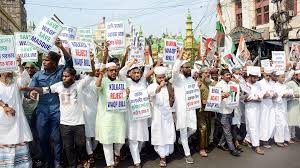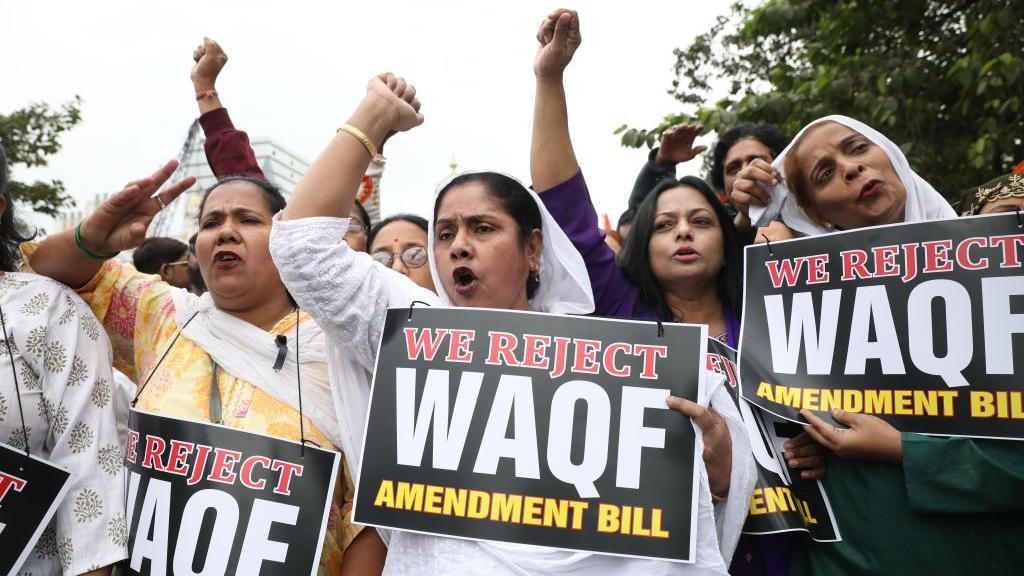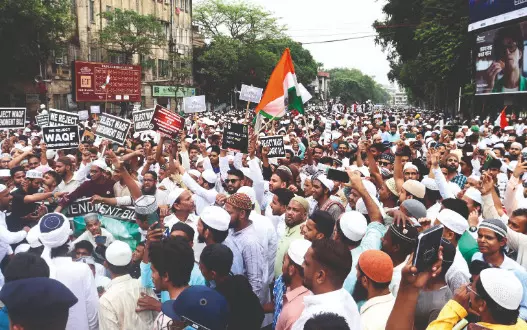Massive Protests Across India Against the Controversial Waqf Amendment Bill; Muslims Take to the Streets After Friday Prayers
Protests also erupted in Ranchi (Jharkhand), Kolkata (West Bengal), Ahmedabad (Gujarat), Coimbatore (Tamil Nadu), and Uttar Pradesh, with the latter on high alert.
New Delhi ( WEB NEWS )
On Friday, Muslims across India held widespread protests after Friday prayers against the controversial Waqf Amendment Bill. In New Delhi, students of Jamia Millia Islamia led a major protest under the leadership of the All India Students Union Association and other student organizations. Protesters condemned the bill, calling it a blatant attack on minority rights.
In Gujarat’s Ahmedabad, thousands gathered at the historic Jama Masjid and Sidi Saiyyed Mosque, raised slogans, and blocked major roads. Police tried to stop the demonstrations and detained more than 50 protesters. Protests were also seen in Chennai (Tamil Nadu) and Coimbatore, where members of Tamilaga Vetrik Kazhagam and Muslim organizations took to the streets demanding the bill’s withdrawal.

In Bengaluru (Karnataka), protesters demanded the immediate cancellation of the bill. In Bihar’s Jamui district, thousands gathered at the Raja Nagar Gousia Mosque after Friday prayers and raised slogans against Bihar Chief Minister Nitish Kumar, former CM Jitan Ram Manjhi, and Indian ministers—especially Chirag Paswan—for supporting the bill.
Protests also erupted in Ranchi (Jharkhand) and Kolkata (West Bengal). In Ranchi, thousands of Muslims gathered outside Ekra Mosque after Friday prayers, holding banners and expressing their strong opposition. Protesters called the bill an attack on their constitutional rights and demanded its immediate withdrawal. In Kolkata’s Park Circus Crossing, hundreds of Muslims took to the streets, claiming that the BJP was using the bill to divide the nation and to grab Muslim properties under the guise of legal amendments. They stated that the bill was merely a tool for the BJP to advance its divisive agenda.
Meanwhile, authorities placed Uttar Pradesh on high alert. Heavy police deployment was made in major cities including Lucknow, Sambhal, Bahraich, Moradabad, Muzaffarnagar, Saharanpur, and Noida. In Lucknow, drone and CCTV surveillance was intensified to monitor public gatherings.
It is noteworthy that on Friday, the Indian Parliament’s Upper House, the Rajya Sabha, approved the controversial Waqf Amendment Bill. Once signed by the President, it will become law. Due to uproar from both ruling and opposition parties, the proceedings of both houses of Parliament—Lok Sabha and Rajya Sabha—were adjourned.

In the Lok Sabha, as soon as the session began, members from the Congress and other opposition parties stood up and started chanting slogans, with some entering the well of the house. On the other hand, members of the ruling BJP, including Nishikant Dubey, stood at their seats demanding an apology from Sonia Gandhi. Speaker Om Birla tried to continue the Question Hour, calling it an important time, but the uproar from both sides continued. When order could not be restored, the session was adjourned.
Similarly, in the Rajya Sabha, Chairman Jagdeep Dhankhar initially adjourned proceedings until noon, and then again until 1 PM, due to the ruckus. Consequently, the Zero Hour and Question Hour could not be held. When the session resumed at noon, members from both ruling and opposition parties began speaking loudly. Congress Deputy Leader Pramod Tiwari attempted to speak on the Waqf Amendment Bill, but the chairman said there was no point of order and again adjourned proceedings.
After essential legislative documents were presented in the house, BJP’s Laxmikant Bajpai raised the issue of the Supreme Court upholding the Calcutta High Court’s decision to cancel the appointment of 25,000 teachers in West Bengal. This led to a heated exchange between the ruling and opposition parties, forcing the chairman to adjourn the session once more.
It is worth mentioning that Muslim organizations across India have consistently expressed strong opposition to the Waqf Amendment Bill. Both the government and Muslim organizations estimate that the Waqf Board owns around 851,535 properties and 900,000 acres of land, making it one of the top three largest landowners in India.
The bill proposed by Prime Minister Narendra Modi’s government includes provisions to induct non-Muslim members into the Central Waqf Council and Waqf Boards. It also gives the government authority to determine ownership of disputed waqf properties. The law has emerged during a period of heightened tension between the Muslim community and the Modi government, and has now been passed by both houses of Parliament.

